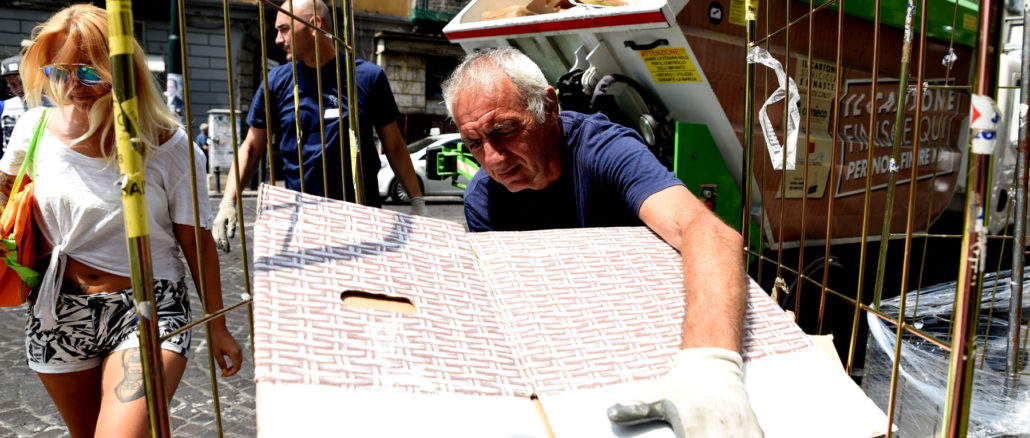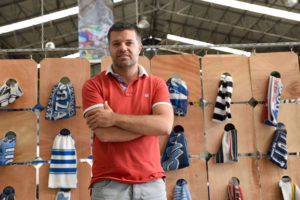
In Rione Sanità, a Naples’neighbourhood, every day 2.3 tonnes of cardboard are collected. An excellent result thanks not only to the collaboration between citizens and retailers but above all to having been able to use recycling as an opportunity for social promotion and job creation. Now the idea is to transfer this know-how to create a model to be exported to the rest of the city, and beyond.
It is one of the areas with the highest population density in Italy. It is an old town centre. It is in Southern Italy, but recycling is working. We are talking about Rione Sanità in the centre of Naples, 67,000 inhabitants with a population density of 13,400 people per km2 (Casavatore, near Naples, one of the most populated municipalities in Italy has “only” 12,253 people per km2), where since December 2014, the collection of cardboard, especially, has become a real success story. Narrow lanes, often uphill, small trading outlets with two markets are just some of the peculiarities that Ambiente Solidale, a social cooperative, has to tackle daily to carry out its cardboard collection in this neighbourhood. A business that very few people would be brave enough to start even in more “welcoming” areas such as Rome’s historical centre, where in early 2015 daily cardboard collection amounted to 4.7 tonnes but with a population of 196,000 people. “In Rione Sanità we now collect 2.3 tonnes of cardboard daily and we estimate that there has been a 200% increase compared to the previous collection system”, declares Antonio Capece, Chairman of Ambiente Sociale cooperative. “But it is not just a simple collection because the neighbourhood is a complex reality and we had to use novel resources and methods.”

Rione Sanità’s urban and social topography is indeed complex. “We use a small vehicle to be able to reach all areas, with 6 employees, 6 days a week”, Capace continues. “With these restrictions, we have to unload six times a day at the collection centre, but we collect almost exclusively clean and top quality cardboard, especially thanks to citizens and retailers’ great collaboration.” And this collaboration, crucial for the success of this initiative, is not taken for granted and is made possible by a mix of social rather than technical elements. Indeed, the cardboard collection project was created after years of mishaps and changes of direction in the waste management front.
In the 1990’s, waste management was outsourced by municipality-owned ASIA and was later internalized by De Magistris Council to check scandals and bad management of the service. Early in the 21st century, this led to out-of-control waste fires in the city. On this basis, it is understandable that citizens’ confidence for sustainable waste management was in reality minimal. “In summer 2012, I got a telephone call from Luca Meldolesi, a professor of economics at Università Federico II in Naples, who after a meeting with Marco Vitale, a business economist, and Carlo Montalbetti, Comieco CEO, told me that problems in Naples were severe and that cardboard collection was even decreasing” Paolo Caputo says, a business economist who together with Roberto Celentano, a development economist, promoted the experiment. “So, we started working, bearing in mind that in a difficult city such as Naples it is necessary to create some kind of concurrence of interests amongst citizens that also offers economic implications. That is, retailers or citizens have percentage in keeping the city clean while other citizens have percentage in transforming the solution to this problem into job opportunities.” And it was exactly a grassroots network that enabled the cardboard collection project to take off.
The project received an important push from Father Alex Zanotelli who got the church involved as well as Rete Sanità, a citizens’ organization. It was also embraced at institutional level, especially by Tommaso Sodano, who at the time of the project opening was deputy mayor of Naples. As far as rooting the project in the local reality is concerned, the work of 35-year-old Father Valentino De Angelis, Santa Maria dei Miracoli’s parish priest who had served in Rione Sanità for two years, was crucial. “An impartial moral authority was absolutely necessary to make this presence real, especially in an area where people had forgotten all about the environment.” Alex Zanotelli’s proposal on cardboard collection was a tangible way to make hope equally tangible in area where people had forgotten about the environment. Father De Angelis’ Parish became an important point of reference for this initiative, so much so that the church’s premises became a “collection point”. “Parishioners’ response has been very positive and I would say that the initiative has been welcomed with enthusiasm because the citizens’ desire to do something for Rione Sanità is very strong”, Father De Angelis continues. “What is lacking in Rione Sanità is the presence of the institutions, it is difficult to see them, and it often seems that the neighbourhood is a no man’s land where controls are non-existent. This is the very reason why the parish can play such a crucial role.” And the references to the importance of recycling and respect for creation that Father De Angelis throws in during Sunday mass are also very important. “It is not true that these are ‘waste’ people and that the whole neighbourhood must be recycled”, Father De Angelis concludes, talking about Rione Sanità people while trying to reach a family in the neighbourhood on his scooter. “Rione Sanità is perfectly capable of recycling and I think that the future will follow this trend, with the collection of other materials.”

Also, we must not forget that Rione Sanità, besides presenting social and urban planning problems, is beset by high unemployment as well and this is why even the choice of the company appointed to carry out the collection has been strategic from a communication point of view. “Choosing a cooperative that employs former inmates and drug addicts is a strong signal”, Antonio Capece states, coming out from Santa Maria dei Miracoli Church. “Besides being a signal, it is also a symbol and a value combining the environment, economy and employment, strongly characterizing recycling.” Ambiente Sociale cooperative pays particular attention to the integrated aspect of its activity when it comes to social as well as environmental sustainability. On well-established activities such as used clothes, it allocates a share of its revenue to fighting food poverty, but for Rione Sanità it has done even more. “Waste collection operators are people from the neighbourhood” says Delia Del Gaudio, Ambiente Sociale Communication manager. “People who know the neighbourhood very well, its inhabitants and in turn they are also recognized by citizens. This enables us to have monitoring devices, antennas in the area, proving that recovery and recycling can offer an improvement opportunity for people with a difficult past, through work and at the same time an opportunity of amelioration for Rione Sanità.”

In just a few months, the cardboard collection experience in Rione Sanità highlighted a lot of positive signals and potential for this method and the top echelons of the Municipality got involved. Tommaso Sodano, as deputy mayor, created a call for tenders to expand Rione Sanità’s experiment to 675,000 citizens in Naples, that is 65% of the Neapolitan territory. The challenge is to use a recycling experiment to create a model to be adopted in the whole city and beyond. Ambiente Solidale took part in the call for tenders in partnership with Cooperativa Arcobaleno from Turin. The aim is to export the know-how developed in Rione Sanità to improve cardboard collection and using recycling as a means of social promotion. A new model to find a connection between the environment and social protection, two aspects that in Italy still have great difficulties even just to communicate with each other.
Info:
www.ambientesolidale.it
www.comieco.org

Lascia un commento